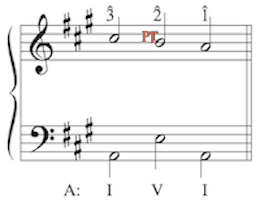
HARMONIC EXPANSIONS
CHAPTER 1: EXPANDING THE TONIC TRIAD; THE FUNDAMENTAL HARMONIC PROGRESSION
1.5 Expanding the tonic triad with passing tones
 |
 |
 |
 Stephen Foster, Civil War tunesmith. |
End of "Oh Susannah" by Stephen Foster: melody 3, 2, 1 supported by I V I. |
|
In the above arrangement of the last phrase of Foster's "Oh, Susannah", the flute descends with scale degrees 3, 2 and 1 over I V I harmony. In the last two chords the leading tone rises in the guitar and the remaining inner voice falls by third. As on the previous page, the resulting final chord is missing its fifth, G. When the fundamental harmonic progression has scale degrees 3, 2, 1 in the soprano, the embellishing tone, 2, is called a passing tone, labeled “PT” in the illustration to the right. Passing tones are approached by step from a more stable note and then move by step in the same direction to another more stable note. |
Scale degree 2 as passing tone
|
Voice Leading
|
 |
Your turn! Write I V I progressions as in the above examples. 1. DOWNLOAD pdf file 01.5 to print out and write on. 2. ENTER your part writing on the Harmonic Expansions 1.5 page in Noteflight. |
 |
 |
 |
 |
Comments? Click here. |



